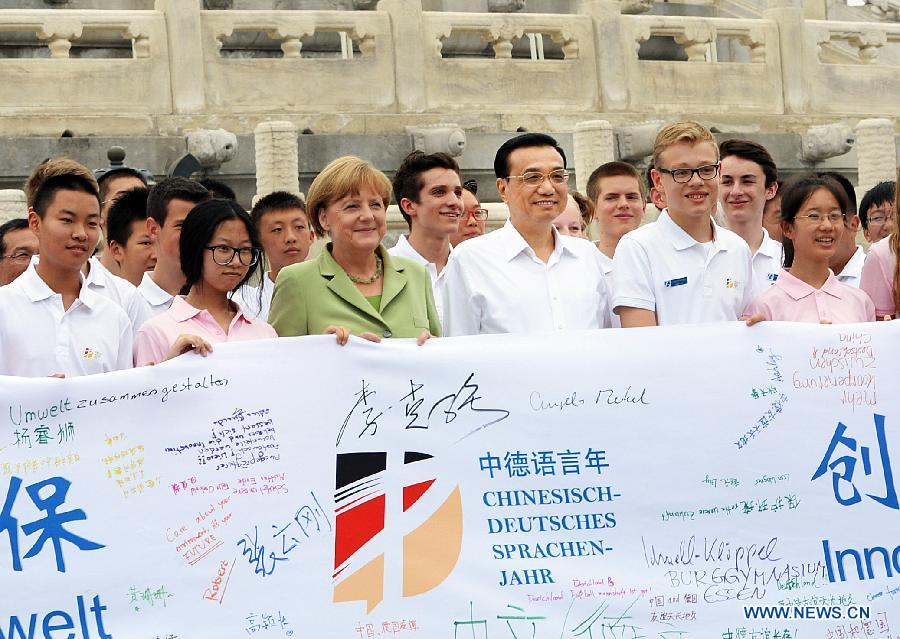China and Germany: a new type of great power relations
china.org.cn / chinagate.cn by Jiang Shixue, July 10, 2014 Adjust font size:
|
|
|
Chinese Premier Li Keqiang and German Chancellor Angela Merkel pose for a group picture with youngsters attending the closing ceremony of "the Year of Languages" program between China and Germany, an initiative meant to encourage the two peoples to study each other's language, at the Temple of Heaven, a famous scenic spot in Beijing, capital of China, July 7, 2014. [Xinhua] |
Third, cooperation and exchanges in other areas are also flourishing. There are now more than sixty official mechanisms for exchanges and dialogues between China and Germany, including inter-governmental consultations. It was reported that Germany has established inter-governmental consultations with very few countries in the world. This is also the first dialogue China has set up with a major world power.
The Goethe Institute was one of the earliest foreign institutions engaged in cultural activities in China, and China has established more than ten Confucius Institutes in Germany offering Chinese language lessons. Furthermore, at present there are more than 70 flights each week linking more than ten cities in the two countries, carrying Chinese and German tourists, business people, students, scholars and others.
Germany's close ties with China have been described as "special relations" by the European Council on Foreign Relations, a European thinktank. Whether the relationship between China and Germany is "special" or not, the truth is that during President Xi Jinping's official visit to Germany in March 2014, the two nations agreed to upgrade their existing ties to what is called an Overall Strategic Partnership (OSP), the highest level of bilateral relations in the world today.
In order to make the NTGPR or the OSP more tangible and meaningful, it is imperative for the two sides to deepen both political trust and mutual understanding.
Political trust entails respect for each other's "red line" of national interests. Tibet is one of the "red lines" for China. We should not forget the set-back of Germany's relations with China after Merkel met with the Dalai Lama in Berlin on September 23, 2007. It is encouraging to see that since then Germany has respected China's stance on Tibet and Taiwan.
Indeed, China and Germany have different political systems and it is totally impossible for them to abandon their own system and adopt the other. But both need to recognize the different understanding of such issues as democracy, freedom and human rights. After all, as Xi once said, only the person wearing the shoes knows whether the shoes are comfortable or not.
Political trust is closely linked to mutual understanding. Lack of deep mutual understanding often results in misperceptions and wrong judgments. Sadly, despite China's efforts to make itself known to the outside world through Confucius Institutes, China Daily, CCTV News and other ways, its image in the minds of many Germans is not as good as it should be. According to "The Country Ratings Poll" of 24 nations, conducted for BBC World Service by the international polling firm GlobeScan and the Program on International Policy Attitudes at the University of Maryland, among 24,542 people around the world between December 2013 and April 2014, perceptions of China in surveyed African and Latin American countries were mostly positive. But In the EU countries, Germans have become increasingly negative towards China, with 76 percent perceiving it negatively. This is up nine points since 2013 and is Germany's most unfavorable rating of China since 2005.
Working for a youth exchange program recently between China and Germany, I was surprised to learn that almost none of the ten-plus bright German young professionals in the team knew that there are nine political parties in China and the Communist Party of China is only one of them. Lack of understanding about China is probably one of the reasons why Germans do not have a fair perception of China in the BBC's country rating poll.


